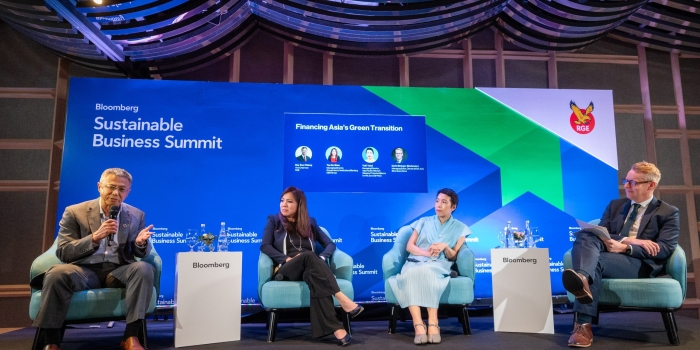Apical Ups the Bar with Enhanced Sustainability Dashboard
Abundant sunshine, regular rainfall and tropical climate are fecund conditions for the growth of oil palm, and nowhere do the oil palm flowers bloom more proudly than along the tropical...

Latest updates on what's happening in RGE Group

How are public and private sector leaders leveraging finance and innovation to scale-up sustainability practices in Asia’s economy? Does Asia require a more flexible approach to transition finance that can adapt to country, sector and company specific situations? How can a greater regional consensus be achieved on transition issues? These were some of the questions discussed during a panel at the Closing Dinner for the Bloomberg Sustainable Business Summit in Singapore on 31 July.
Titled “Financing Asia’s Green Transition”, more than 50 senior executives from the business and banking sector heard from a panel comprising RGE Vice Chairman Bey Soo Khiang, DBS Deputy CEO and Group Head of Institutional Banking Tan Su Shan, and GFANZ Managing Director Yuki Yasui, moderated by Bloomberg’s Climate & ESG Editor David Stringer.
Yuki opened the discussion by addressing the complexities of financing the green transition. She emphasised that green finance involves more than just funding; it requires a systemic shift for companies in the brown economy to adopt sustainable practices. “We need to create an enabling environment for the real economy to demand green finance,” she said. This transition necessitates collaboration among financial institutions, regulators, policymakers, and consumers to build a robust ecosystem supporting green initiatives.
Su Shan offered a pragmatic perspective, stressing the importance of impactful and financially sustainable solutions for greening the supply chain. Asia, she noted, is responsible for half of the world’s greenhouse gas emissions and faces significant challenges due to its reliance on coal. She argued that practical solutions include transitioning from coal to cleaner energy sources and phasing out coal-fired power plants. “The only practical solution is to find a financially sustainable way to close coal plants early,” Su Shan explained. Sometimes, banks might need to fund the purchase and development of fossil fuel industries to shut them down faster, thus reducing excessive carbon emissions.
Su Shan also highlighted the necessity for banks to be stringent in their collaboration choices, focusing on ‘greening’ the supply chain. She cited DBS’ partnership with H&M as an example. By financing green initiatives for H&M’s suppliers in India, DBS has contributed to a more sustainable supply chain, demonstrating mutual benefits for both the bank and its clients.
Soo Khiang acknowledged that greening the supply chain is challenging, especially when translating global sustainability goals into actionable strategies in local markets. He described RGE’s approach, explaining that “this means creating solid plans and targets and integrating them into business operations.” RGE’s targets include zero tolerance for deforestation, net zero by 2050, 30-50% lower carbon emission intensity by 2030, and ensuring 100% of its financing is in sustainability-linked loans.
He highlighted RGE’s ‘APRIL2030’ initiative, a commitment by its pulp and paper business to achieve net zero carbon emissions and promote biodiversity. This initiative, built on pillars such as Climate Positive, Thriving Landscape, Inclusive Progress, and Sustainable Growth, addresses environmental impacts while supporting social and economic progress, setting a benchmark for sustainable business practices.
Achieving carbon neutrality is challenging but attainable. Soo Khiang illustrated this with an example from RGE’s LNG plant in Canada, which uses electric drives and hydro power, emitting only one-tenth of the industry standard carbon emissions.
RGE also leverages sustainability-linked loans (SLLs) to align financial goals with sustainability objectives. “SLLs are ideal for RGE’s sustainable resource-based businesses as they align with our company’s DNA and our business groups’ sustainability goals,” Soo Khiang said. Collaborating with banks and third-party experts ensures rigorous evaluation of sustainability targets and performance, providing transparency and credibility.
For the small and medium-sized businesses (SMEs), Su Shan emphasised the importance of supporting them on their net zero journey. Given their lack of resources and knowledge, DBS is working with Enterprise Singapore to provide funding and training through the ESG Ready Programme, helping SMEs transition to lower carbon business models.
Yuki further elaborated on GFANZ’s outreach efforts to support financial institutions beginning to explore net zero commitments. GFANZ focuses on peer-to-peer learning and knowledge exchange at various levels, from CEOs to practitioners. However, engaging local financial institutions in emerging markets remains a challenge, as international institutions often lead in supporting national net zero goals. GFANZ is working with local regulators to create an enabling environment that fosters active participation from domestic financial institutions.
Touching on regional variations, Su Shan pointed out it will require significant time and effort to achieve Asia’s sustainability goals due to its diverse business cultures and customs. “Asia may not achieve its sustainability goals in five years or even a decade,” she said. Despite geographic differences in conducting business, Soo Khiang affirmed that fundamental principles remain consistent. For example, in Indonesia, a blanket ‘no deforestation’ policy may not be realistic due to socio-economic factors. Solutions must balance sustainability with development needs.
Despite the challenges, Soo Khiang is optimistic about Asia’s potential. The region’s mix of economic powerhouses and developing nations offers significant opportunities for sustainable development. “As corporates transition to more sustainable practices, those left behind may face greater challenges in securing funding, and banks risk holding non-performing loan assets,” he noted.
With the right strategies, incentives, and public-private sector collaborations, Asia has the potential to become a leading platform for a prosperous and inclusive sustainable society. The insights from the Closing Dinner panel highlight the critical role of collaboration and innovation in driving and financing Asia’s green transition.